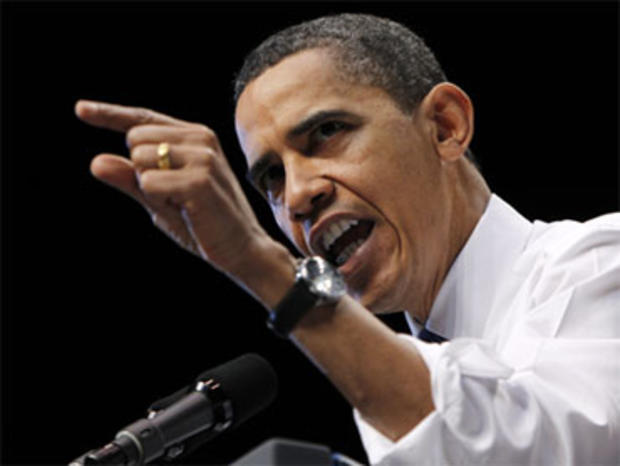U.S.-Syria Relations: Rollercoaster Diplomacy
This story was filed by CBS News' George Baghdadi in Damascus. Click here to read more on Syria in "World Watch".
Syrian President Bashar al-Assad may be rightly baffled by Washington's jumbled, somewhat indecisive approach to renewed engagement with his country.
One the one hand, the Obama administration has given some clear signals suggesting it wants better ties with the Arab state in the heart of the Middle East. On the other, the White House has made some moves which suggest exactly the opposite.
Washington's ties with Damascus have been strained by Syria's three-decade alliance with Iran and U.S. allegations of meddling in the affairs of Iraq, Syria's neighbor to the east.
Syrian support for the Lebanese Shiite group Hezbollah and Palestinian Islamist movement Hamas, which rules Gaza, have also proved a stumbling block. Both factions, considered terrorist organizations by the U.S. government, are seen in Syria - and the wider Arab world -- as legitimate resistance movements and political parties.
Former President George W. Bush imposed economic and diplomatic sanctions on Syria in May 2004.
The U.S. Embassy in Damascus has been without an ambassador since February 2005, when the Bush administration recalled Margaret Scobey in response to the assassination of Lebanese Prime Minister Rafik Hariri. Syria's foes in Lebanon accused Damascus of being behind the bombing, allegations Syria has repeatedly denied.
Since taking the oath, President Obama has cautiously sought to improve ties with Syria, and U.S. lawmakers have made a flurry of visits to Damascus.
Deputy Foreign Minister Fayssal al-Mekdad, a leading figure in Syrian foreign policy, also visited Washington.
Sen. John Kerry wrapped up an undisclosed two-day trip to Damascus this weekend for talks with Assad to try and breathe some life into the stumbling peace process, "as part of his capacity as the chairman of the Senate Foreign Relations Committee," according to one U.S. Embassy official in Damascus.
The source refused to go into the specifics of the discussion.
Syrian Foreign Minister Walid Mouallem welcomed the visit, which was not made public earlier by the Syrian state-run media, and said Damascus would do whatever it could to help push peace in the Middle East.
The visit was another positive signals from the U.S.
Earlier this month, despite the sanctions, the U.S. government approved a plan to upgrade Western aircraft in Syria's passenger jet fleet, which includes American-made Boeing 747 and French Airbus 320 jets -- both of which require U.S. parts. That was another encouraging step.
Perhaps most symbolically, Obama nominated in February career diplomat Robert Ford to be America's first ambassador to Syria in five years, though his appointment has yet to be confirmed by the U.S. Senate.
However, hopes of rapprochement between the U.S. and Syria were dashed this month by a blunt charge from Mr. Obama himself.
"Syria still poses an unusual and extraordinary threat to the national security, foreign policy, and economy of the United States," said the U.S. leader as he renewed the sanctions for another year.
The statement suggests Syria has fallen from the pages of Mr. Obama's good books and that the relationship with Washington may be coarser for some time.
The positive momentum took another hit later when Israel claimed Damascus was sending advanced weaponry to Lebanon's Hezbollah militants -- Scud missiles which could theoretically increase the group's ability to strike targets anywhere inside the Jewish state.
Damascus has strongly denied the allegations and suggested Israel was searching for an excuse to start a new war in the region.
Lebanese Prime Minister Saad Hariri has also dismissed the accusations, comparing them to claims that Iraq had unconventional weapons before the American-led invasion in 2003. The U.N. has also refuted the charges.
However, 12 Republican senators, in a letter to Secretary of State Hillary Clinton last week, claimed that Ford's appointment would be a concession, even a reward. They suggested "prompt punitive" action against Syria instead.
It's no secret what the Americans want from Syria, but it's harder to guess what cards Assad might be prepared to put on the table.
Syrian officials say they will not make concessions for free. The West, they argue, should not expect much as Damascus will not break its alliance with Iran, nor will it abandon Hezbollah or Hamas before it hears an offer on a comprehensive peace deal between Arabs and Israelis.
"The West should realize that the region has changed and that the language, policies and approaches that it used to use before have become unacceptable," Assad told French Foreign Minister Bernard Kouchner, who arrived in Damascus Saturday night.
"If the West wants to see stability and security in our region, it should start playing an effective role in curbing Israel and stopping its extremist and grave attitude," added the Syrian leader.
